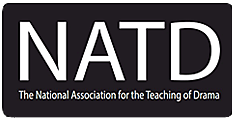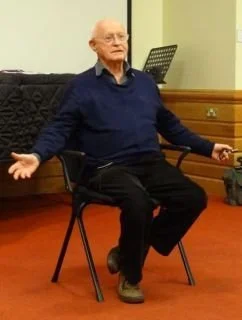Obituary: Edward Bond
Edward Bond
18 July 1934 – 3 March 2024
Written by Lewis Frost
I first met Edward Bond at the National Association for the Teaching of Drama conference in October 1989. I was working with the Actors Group theatre company at the time and following that with the Dukes Theatre in Education Company, which like many others was soon under threat of closure. He gave a key input to the conference - “a potted history of drama”; it was a history of how society has organised itself. It was fascinating and it had the effect of making one see drama’s current situation with a newness and urgency. His conference speech provoked and inspired in equal measure. I started exploring his essays and notes, and I began writing myself, not a play at that point but a manifesto for theatre, written against a backdrop of the closure of the country’s last TIE companies. In the ensuing period Edward was to become a leading voice in the defence of theatre-in-education.
As a playwright he didn’t just concern himself with the art and craft of writing. He was as invested in every aspect of the production of the play, directing, design, through to how it would engage the audience, and what would happen in the gap in which the audience, the actors and the play met. He seemed to be continually formulating new theories of drama as though reality was always running ahead too fast, which of course in a way it was. Each new theory never superseded or invalidated the previous ones, but added to them. His older ideas and polemics are as relevant as if he’d just written them and I find myself going back to them for sustenance. He most recently thought of the audience as the play-within-the- play. It was another way of articulating the new drama he understood we so desperately need. The audience, being the ‘play-within-the-play’, is how the meaning of their daily lives comes into the gap, it’s how they give the drama “its vulnerable objectivity, it’s cultural presence”, (prompted I believe by Hamlet where the play within the play communicates the truth of the situation), something which he felt that the entertainment industry shuts out from its stories.
By this time, (I won’t say late in his career, he would despise that term) Bond had already parted company with the mainstream of English theatre, even though he had produced writing widely acknowledged as among the best in post-war Britain. It was after the RSC put on his play the Great Peace (1985), which he said was a “grotesquely bad production” that was the last straw according to him. He began to think that the English main stages could not be trusted to perform his work as he envisaged it. He decided to focus on productions in France and Germany. The exception to this was his long collaborative relationship with Big Brum whom he wrote for, and which is where I saw his later work performed. Big Brum’s stage was one of the few places where you could see his work produced in the UK.
More recently in 2019, I staged a production of his play, ‘Have I None’. We began a regular correspondence. I found Edward’s generosity towards new writers and directors, underscored his passion and striving for a new form of drama. But I believe that it was also that he simply wanted to be useful as an artist, to theatre practitioners and his audiences. His depth of feeling led him to be regarded by some as too serious and a little po-faced or worse. But he regarded humour and comedy as importantly as intelligence in what makes us human, and saw himself as a comic writer. In fact, the farcical nature of ‘Have I None’ was one of the principal reasons I enjoyed working with actors on it.
Edward’s rigour and exactitude when channelled into his directing work was not always appreciated by some actors. Whilst I never had a first-hand experience of his directing in the rehearsal room, I suspect he was operating in an entirely different paradigm from the more conventional modes many actors are used to. I would have loved to have seen him direct one of his plays, not least because as he said, questions about acting technique could only really be answered in the rehearsal room. After I sent him the reviews I received from my first staging of ‘Have I None’, he picked up on one which referred to me as an ‘actor’s director’. This is what he wrote to me:
I see from the review that you are an actor’s (sic) director. (Read actors’). You couldn’t be more highly praised. Please pass my thanks and congratulations to the actors and company.
His playful shifting of the punctuating apostrophe to the possessive in “Read actors’ ”, hinted I suspect at a very different approach.
In November 2022 I spent a morning in conversation with Edward Bond on camera. This was in advance of a further staging of ‘Have I None’ and the film was to be screened after each performance. He answered my many questions with gravitas and humour. His reactions were often unpredictable, he was always on his guard against the habitual behaviour of others, which he understood as a product of society’s implicit ‘training’. He didn’t challenge or provoke for the sake of it, but he did to take an impish delight in contradicting the conventional wisdom.
Shakespeare changed my life, I’d ban him.
He grabs your attention with that statement. But did he really just say that? He chuckles as if he has surprised himself as much as you and then goes deeper to elaborate the why of it.
Shakespeare couldn’t possibly ask the right questions as the world has changed so much… why were there no world wars before World War One? Because the situation didn’t make them, the situation has changed therefore Shakespeare can’t really ask the questions that are important for us today.
He was frequently paradoxical in this way, by his own admission often deliberately so.
Listen to the audience, respect the audience and don’t entertain them. So that’s what I believe… no I don’t, because I (myself) like being entertained.
His programme notes were littered with paradoxes and reversals, frustrating for some, but for many including me, they were markers on the rich trails which could be followed.
With all his theorising I never found Bond’s plays to be didactic. He himself never claimed to have all the answers, but he was most alert to and never turned away from the problems that are so commonly ignored. He leaves behind a tremendous body of written plays, letters, notes and essays on theory. He died in the saddle, with plans to pen a new series of comedies. He said, there is still so much that he has to write and share. He is irreplaceable. It is a huge loss.
A Tribute To Edward Bond from the National Association for the Teaching of Drama
Written by Guy Williams
…using drama with young people, can solve the problems of our society – this is what gives us a possible life in the future… We must create the situations where the young people can say this is what I am, this is what I stand for.
Edward Bond at the 2014 NATD Conference
At last year’s AGM (2023), Edward Bond was given Honorary Life membership of the Association:
Following his continued, active support for the association and the teaching of Drama-in-Education, his commitment to and concern for young people as well as his commitment to a sixty year development of a radical vision for Theatre and Theatre-in-Education, the NEC is honoured to announce Edward Bond as an honorary lifetime member of NATD.
The motion was passed unanimously.
In 1989, Bond gave a key note address at the NATD conference, The Fight for Drama - The Fight for Education[1] alongside Dorothy Heathcote. It was an electrifying experience at a time when education in general and Drama in particular were under attack as never before. In a postscript to his address when published the following year he laid out his understanding of the centrality of Drama teaching in society and his commitment to those who fight for it:
On reflection I think I didn’t enough stress – directly – the importance of what you do. The ‘self-dramatisation’ of children is really the process by which they’re inducted into society; drama becomes their medium of knowledge and of self. Its conscious examination isn’t, therefore, an extra to education but the foundation of all education: it’s probably the way in which adults retain the philosophical birthright of the child.[2]
Over the next thirty-five years, Bond was actively involved with the Association, contributing some sixteen articles to The Journal for Drama in Education as well as addressing the 2014 Conference in Oxford. He worked extremely closely with Big Brum TIE Company in Birmingham, writing nine plays for them and their director, Chris Cooper. It was an extremely fertile period when little of his work was being performed in this country and he was pushing at the boundaries of what theatre should be and continuously reformulating his thinking alongside the Company.
He was also tireless in his support of members who reached out to him, always willing to reflect on their experiences with them, learning from them and sharing back his interpretations of their world.
Your account of the lives of these young people is shocking in its sweep and terrifying in its details. And other children go to private schools and expensive “crammers” and their parents are misled by rabble-rousing press and abused by trivial media. It makes me angry when politicians and guru philosophers say we live in a democracy. (I hope it’s the sort of anger that stops you despairing.)[3]
For the past thirty years, our Policy Document has included a statement from Bond at its heart. It is an inspiration and a warning to us all,
The games young children play amongst themselves involve their body and their mind. As they grow they naturally turn more and more to their society for involvement in their games: young people throw open to us all the doors – and if we do not enter the doors we estrange the young, making them society’s enemies or (surely worse) its submissive, irresponsible automatons. This is the punishment we bear for our irresponsibility.
His politics, his challenge, his understanding of Drama, Theatre and humanity will be sorely missed, not least in such dark times.
[1] Edward Bond: The Fight for Drama. The Fight for Education (youtube.com)
[2] The Fight for Drama – The Fight for Education Ed Ken Byron, NATD, 1990. P21
[3] Unpublished email

